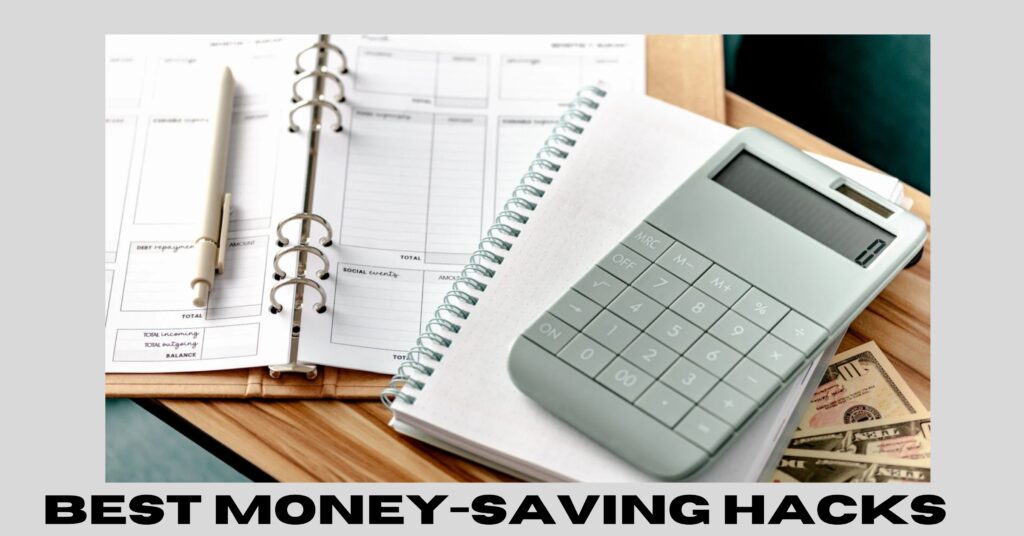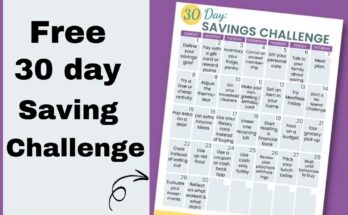Looking for money-saving hacks that help you keep more cash in your pocket? These simple tricks make it easier to stretch your budget without giving up the things you love. By making small, smart changes to how you shop, spend, and save, you can cut costs on everyday expenses and build your savings faster.
Here’s a list of the best money-saving hacks that actually work.

1. Use Cash Back Apps
Cash back apps help you save money on everyday purchases, including groceries, gas, and online shopping. These apps reward you for spending by giving you cash back or points that you can redeem for gift cards and discounts.
Some of the best cash back apps include Fetch Rewards, Rakuten, Upside, and Honey. These apps allow you to earn rewards simply by scanning receipts, shopping online, or filling up your gas tank.
2. Get a Library Card
A library card is a great way to save money on books, movies, and even digital content. Many libraries also offer free access to audiobooks, magazines, and online learning courses.

Some libraries even lend out tools, state park passes, and board games. If you enjoy reading or learning new skills, a library card is one of the best free resources available.
3. Buy Generic Brands
Switching to generic brands instead of name brands can save you a lot of money on groceries, medicine, and household products. Most generic products contain the same ingredients and offer the same quality but at a much lower price.
Before purchasing, compare labels to see if a generic option meets your needs. This small change can add up to big savings over time.
4. Cook at Home Instead of Eating Out
Cooking at home is one of the best ways to save money and eat healthier. Restaurant meals and takeout can quickly drain your budget, while home-cooked meals cost significantly less.
Planning your meals for the week and cooking in bulk can help you save even more money and time. You can also prepare leftovers for lunch instead of buying expensive meals.
5. Cancel Unused Subscriptions
Many people have subscriptions they don’t use, from streaming services to gym memberships. Reviewing your bank statements can help you identify unnecessary expenses.
Check your phone or credit card account for recurring charges and cancel anything you no longer need. This simple step can free up extra cash in your budget.
6. Shop With a List
Impulse buying can quickly ruin your budget. Making a shopping list before going to the store helps you stay focused on what you actually need.
Stick to your list and avoid browsing unnecessary aisles. This habit prevents overspending and helps you make smarter shopping decisions.
7. Make Your Own Cleaning Products
Cleaning products can be expensive, but you can make your own at home using simple ingredients like vinegar, baking soda, and lemon.
Homemade cleaning solutions work just as well as store-bought ones and are often healthier and eco-friendly. This is an easy way to save money while keeping your home clean.
8. Set Up Automatic Transfers to Your Savings
One of the easiest ways to save money is to set up automatic transfers from your checking account to your savings account.
By automating your savings, you don’t have to think about putting money aside. Even small amounts add up over time and help you build an emergency fund or save for future goals.
9. Use Public Transportation
Owning a car comes with costs like gas, maintenance, and insurance. Using public transportation can help you cut down on travel expenses.
Many cities offer discounted monthly passes for buses or trains, making it a cheaper and more environmentally friendly option than driving.
10. Negotiate Your Bills
Many people don’t realize they can negotiate bills like cable, internet, and even medical expenses.

Call your service providers and ask if they have any promotions or lower-priced plans. If you’ve been a loyal customer, they may offer you a discount to keep your business.
11. Stick to a Budget
Having a budget is essential for managing your money wisely. It helps you track where your money goes and identify areas where you can cut back. Use budgeting apps or spreadsheets to categorize your expenses and set spending limits. Reviewing your budget regularly ensures you stay on track with your financial goals.
12. Buy Secondhand Items
Buying used items instead of new ones can save you a lot of money. You can find quality secondhand furniture, clothing, and electronics at thrift stores, online marketplaces, and garage sales. Not only is this budget-friendly, but it’s also a great way to reduce waste and be more environmentally conscious.
13. Open a High-Yield Savings Account
A high-yield savings account offers better interest rates than a standard savings account, helping your money grow faster. Many online banks offer competitive rates that allow you to earn more on your savings without any extra effort.
14. Check Your Insurance Rates Every 6 Months
Insurance rates can change over time, so it’s important to compare quotes from different providers. By shopping around, you might find a better deal on car, home, or health insurance. Even a small reduction in your monthly premium can add up to significant savings over the year.
15. Have No-Spend Days
A no-spend day means committing to not buying anything unnecessary for an entire day. This habit helps you become more mindful of your spending and allows you to save money by avoiding impulse purchases. You can start with one no-spend day per week and gradually increase it.
16. Buy Discounted Gift Cards
Websites like Raise and CardCash sell discounted gift cards for popular stores and restaurants. Buying these gift cards before making purchases can help you save money on things you were already planning to buy.
17. Use a Rewards Credit Card
A rewards credit card allows you to earn cashback, points, or miles on everyday purchases. Be sure to pay your balance in full each month to avoid interest charges, so you can truly benefit from the rewards without extra costs.
18. Earn Free Gift Cards
Many websites and apps allow you to earn free gift cards by completing simple tasks like taking surveys, watching videos, or scanning receipts. Some of the best platforms for earning gift cards include Swagbucks, Fetch Rewards, and Rakuten.
19. Borrow Instead of Buying
For items you only need once or twice, consider borrowing from friends, neighbors, or your local library instead of buying. This is especially useful for tools, kitchen appliances, and outdoor equipment.
20. Try the Cash Envelope System
The cash envelope system helps you control spending by allocating cash for different budget categories like groceries, dining out, and entertainment.
Once an envelope runs out of money, you can’t spend more in that category until the next month, helping you stay within budget.
21. Pay Off High-Interest Debt First
High-interest debt, like credit card balances, can be expensive over time.
Focus on paying off debts with the highest interest rates first to save money on interest payments and become debt-free faster.
22. Switch to a Cheaper Phone Plan
Many people overpay for their phone plans. Check if you can switch to a cheaper plan with the same features.Some budget-friendly phone carriers offer lower-cost plans that may better fit your needs without sacrificing quality.
23. Wait a Week Before Big Purchases
Before making a big purchase, give yourself at least a week to think about whether you truly need it.This waiting period can help you avoid impulse spending and make more thoughtful buying decisions.
Final Thoughts
Saving money doesn’t have to be difficult. By making small budget-friendly changes, you can cut costs, save more, and reach your financial goals faster. Which money-saving hack will you try first? Let us know in the comments.


